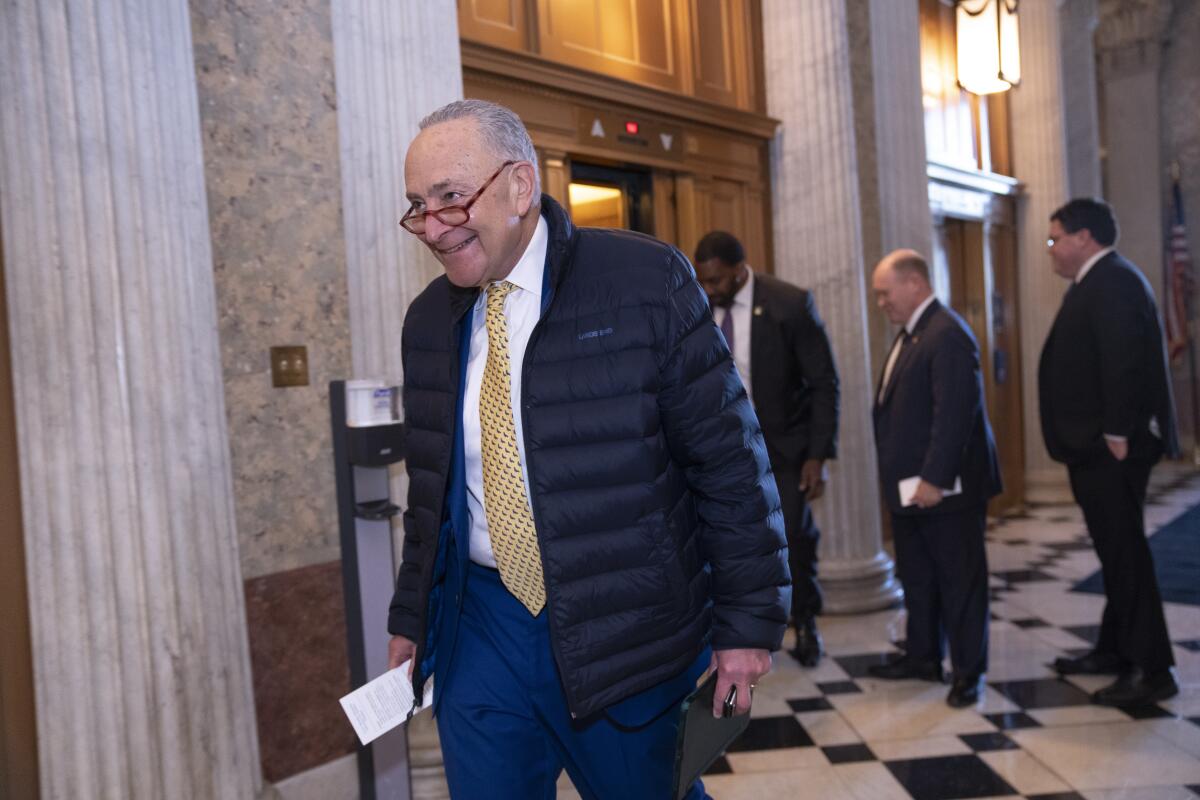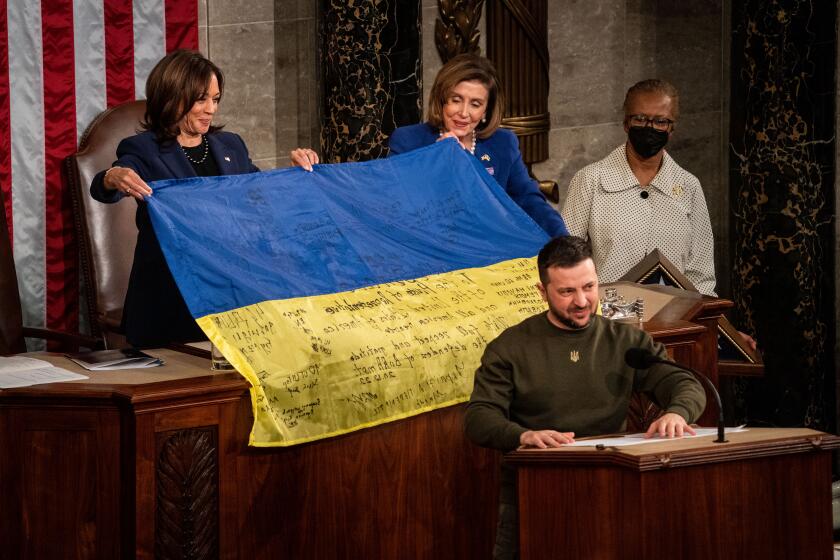Senate passes $1.7-trillion bill to fund the government and aid Ukraine

- Share via
WASHINGTON — The Senate passed a massive $1.7-trillion spending bill Thursday that finances federal agencies through September and provides another large round of aid to Ukraine one day after Ukrainian resident Volodymyr Zelensky’s dramatic address to a joint meeting of Congress.
The bill, which runs for 4,155 pages, includes about $772.5 billion for domestic programs and $858 billion for defense and would finance federal agencies through the fiscal year at the end of September.
The bill passed by a vote of 68 to 29 and now goes to the House for a final vote before it can be sent to President Biden to be signed into law.
“This is one of the most significant appropriations packages we have done in a very long time,” Senate Majority Leader Charles E. Schumer (D-N.Y.) said. “The range of people it helps is large and deep,” he said moments before the vote.
Lawmakers were racing to get the bill approved before a shutdown could occur, and many were anxious to complete the task before a deep freeze and winter conditions could leave them stranded in Washington for the holidays.
Many also want to lock in government funding before a new GOP-controlled House next year could make it harder to find a compromise on spending.
Senators heard from Zelensky about the importance of U.S. aid to his country for its war with Russia on Wednesday night, but when lawmakers left the chamber that night, prospects for a quick vote looked glum. Sen. Chris Coons (D-Del.) remarked that “this bill is hanging by a thread.”
Lawmakers were in disagreement over which amendments were to be voted upon to lock in a final vote on an expedited basis. The impasses had the potential to prevent passage of the bill before the midnight Friday deadline. But negotiations overnight led to a breakthrough, and senators gathered early Thursday to work through more than a dozen amendments before getting to a final vote.
The Ukrainian president, on a dangerous trip from his war-torn country, addressed Congress in an attempt to shore up support from his most important ally.
The House won’t be able to take up the bill until Friday morning, and though it is expected to pass, House Majority Leader Steny H. Hoyer (D-Md.) said the chamber will also approve a stopgap spending resolution to ensure government services continue without interruption before the bill is signed into law.
The spending bill is supported by Schumer and Senate Republican leader Mitch McConnell of Kentucky, though for different reasons.
“The world’s greatest military will get the funding increase that it needs, outpacing inflation,” McConnell said. “Meanwhile, nondefense, nonveterans spending will come in below the rate of inflation, for a real-dollar cut.”
McConnell faced resistance from many Republicans who don’t support the spending bill and said they resented being forced to vote on such a massive package with so little time before a potential shutdown and the Christmas holiday.
“There has not been enough time for a single person to have read this entire bill. The bill and process ignores soaring inflation, rising interest rates and our ballooning debt of $31 trillion,” Sen. Rand Paul (R-Ky.) said. “Enough is enough.”
For two senators, the bill puts the finishing touches on their work in Washington. Sen. Patrick J. Leahy (D-Vt.) is retiring after serving some 48 years in the Senate and as the current chairman of the Senate Appropriations Committee. He negotiated the bill for months with Sen. Richard C. Shelby of Alabama, the committee’s ranking Republican, who was elected to the Senate in 1986 and is also retiring.
“What a capstone to a brilliant career,” Schumer said.
The bill also contains roughly $40 billion in emergency spending, mostly to assist communities across the country recovering from drought, hurricanes and other natural disasters.
And, of course, it includes scores of policy changes unrelated to spending that lawmakers sought to include in what is going to be the last major bill of the Congress; Republicans will be returning to the majority in the House next year in a divided Congress.
One of the most notable examples was a historic revision to federal election law that aims to prevent any future presidents or presidential candidates from trying to overturn an election.
The bipartisan overhaul of the Electoral Count Act is in direct response to former President Trump’s efforts to persuade Republican lawmakers and then-Vice President Mike Pence to reject to the certification of Biden’s victory on Jan. 6, 2021.
More to Read
Get the L.A. Times Politics newsletter
Deeply reported insights into legislation, politics and policy from Sacramento, Washington and beyond. In your inbox three times per week.
You may occasionally receive promotional content from the Los Angeles Times.











